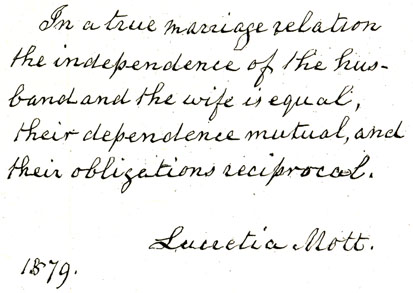About Lucretia Coffin Mott
Lucretia Coffin Mott
Chronology
| Lucretia Coffin Mott (hereafter LCM) was born on January 3, 1793, to
Quaker parents in the seaport town of Nantucket, Massachusetts. When
she was 13, the Coffins decided to send Lucretia to a co-educational Quaker
school, Nine Partners, in Dutchess County, New York. It was here
that Lucretia met James Mott. From 1808-10 she served as an assistant
teacher at Nine Partners, and during that time the Coffin family moved
from Boston to Philadelphia, a city that was to be Lucretia's home for
the rest of her life.
In 1811 James Mott and Lucretia Coffin married, and he engaged in cotton
and wool trade (he later focused only on wool trading as a protest against
the slavery-dependent cotton industry in the South). Between 1812
and 1828 Mott bore six children, of whom five lived to adulthood.
She began to speak at Quaker meetings in 1818, and in 1821 she was recognized
as a minister in the Society of Friends in Philadelphia. |

Courtesy of the Mott Collection, Friends Historical Library,
Swarthmore College |
Throughout their long marriage James Mott encouraged his wife in her
many activities outside the home. The Quaker tradition enabled women
to take public positions on a variety of social problems and in the 1830s
Lucretia was elected as a clerk of the Philadelphia Women's Yearly Meeting.
During the 1820s a rift formed between the stricter, more conservative
Quakers and the tolerant, less orthodox followers of Elias Hicks (known
as the Hicksites). In 1827 first James and then Lucretia followed
the Hicksite branch which espoused free interpretation of the Bible and
reliance on inward, as opposed to historic Christian, guidance. Later
in her life, although remaining a Hicksite Quaker and appearing only in
simple, plain clothing, she often spoke in Unitarian churches; her sermons
show her full engagement in the liberal religious discussions of the day.
LCM's letters reflect her regular travels in the mid-nineteenth century
throughout the East and Midwest as she addressed various reform organizations
such as the Non-Resistance Society, the Anti-Slavery Convention of American
Women as well as the quarterly and yearly Quaker meetings.
Her letters not only express the thoughts of a public figure but they also
show the anxieties and joys of a nineteenth-century woman. Forceful and
intelligent, her letters also reflect Mott's character and Quaker
background.
LCM's only trip abroad occurred in 1840. Chosen as one of six
women delegates from the several American antislavery societies to the
World's Anti-Slavery Convention, she and James Mott sailed for England
on May 5. On June 12, she and the other women delegates were refused
seats, despite the protest of other Americans attending the convention
(such as William Lloyd Garrison and Wendell Phillips). At this conference
LCM met Elizabeth Cady Stanton. Scholars agree about LCM's germinal
influence on Stanton's determination to seek equality for all women.
1848 witnessed the birth of the women's rights movement in the historic
Seneca Falls Convention which issued the women's Declaration of Sentiments,
a call for equal treatment of women. LCM presided over the Seneca
Falls meeting and was the first to sign the Declaration. Until her
death, LCM remained a leader in women's rights organizations. [Link to letter to
Elizabeth Cady Stanton]
Throughout the turbulent 1850s, LCM continued her speaking and engaged
in further antislavery and non-resistant activities. She worked with
other antislavery leaders such as Frederick
Douglass, William Lloyd Garrison, and Lucy Stone. As a Quaker
preaching non-violence, LCM denounced the Civil War but not without some
conflict, for, like other antislavery activists, she hoped the war would
end slavery.
In recognition of her long service to the women's rights cause she was
chosen first president of the Equal Rights Association in May 1866.
Ever the peacemaker, LCM tried to heal the breach between Elizabeth Cady
Stanton/Susan B. Anthony and Lucy Stone over the immediate goal of the
women's movement: suffrage for freedmen and all women? or suffrage for
freedmen first? In the Selected Letters, LCM's private views on this
split are available for the first time.
In her 85th year LCM delivered her last public address when women's
rights advocates celebrated the 30th anniversary of the Seneca Falls convention
in Rochester. Throughout her life, an incisive, challenging mind,
a clear sense of her mission, and a level-headed personality made
her a natural leader and a major force in nineteenth-century American life.
Back to Mott Home
Page